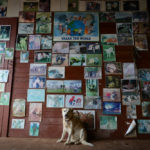Puppies, Pigs, and the Polis had it's final class meeting (along with a special vegan brunch) last week. This course examined how animal ethicists use feminist relational theory, which usually refers to views that are grounded in the claim that people are constituted in and through relationships. The course aimed to spark our imaginations about how to build better worlds with and for nonhuman animals. I was game to keep meeting each week, but the semester must come to an end! The … [Read more...]
Puppies, pigs, and the polis: Feminist relational theory and animal ethics
I've written before about my admiration for and struggles with some of Donna Haraway's work in animal philosophy, and about how helpful I find relational theory. After working through When Species Meet, I decided to teach a philosophy seminar on how relational theory has informed animal ethics! The course revolves around When Species Meet and Sue Donaldson and Will Kymlicka's 2011 book, Zoopolis: A Political Theory of Animal Rights. Although these texts represent different philosophical … [Read more...]
Queer theory: One goose at a time
I'm excited to me back in the class, discussing and learning with students. I thought I would share parts of my Queer Theory course on this space so people can see what we'll be doing--and of course, I always welcome suggestions and critical feedback. This course is cross-listed between Women's Studies and Philosophy. One goose at a time Curious about the subtitle, "One goose at a time"? Join us on October 5 to discuss Alex Johnson's "How to Queer Ecology: One Goose at a Time." I taught a … [Read more...]
Reflections on accountable research in philosophy
What is a philosopher's accountability for their research? To whom am I accountable as a researcher? My philosophical research tends to focus on current social and political issues (for example, Canadian policy and surrogacy or organizational diversity). Despite being embedded philosophically in applied problems, I'm still attracted to "armchair philosophy." This term often refers to a philosopher who primarily relies on their intuitions rather than information about the world. I imagine this … [Read more...]
Space, the final frontier
Elon Musk announced in September 2016 that SpaceX aims to have humans colonizing Mars by 2024. I confess, I was immediately excited. Having been raised on Star Trek, expanding the reach of human exploration has been part of my imagination for a long time. However, when I stopped to think about Musk’s announcement, my excitement dimmed. In particular, I thought about Hannah Arendt's remarks on the launch of the Sputnik satellite on October 4, 1957. In the prologue to the Human Condition, … [Read more...]




